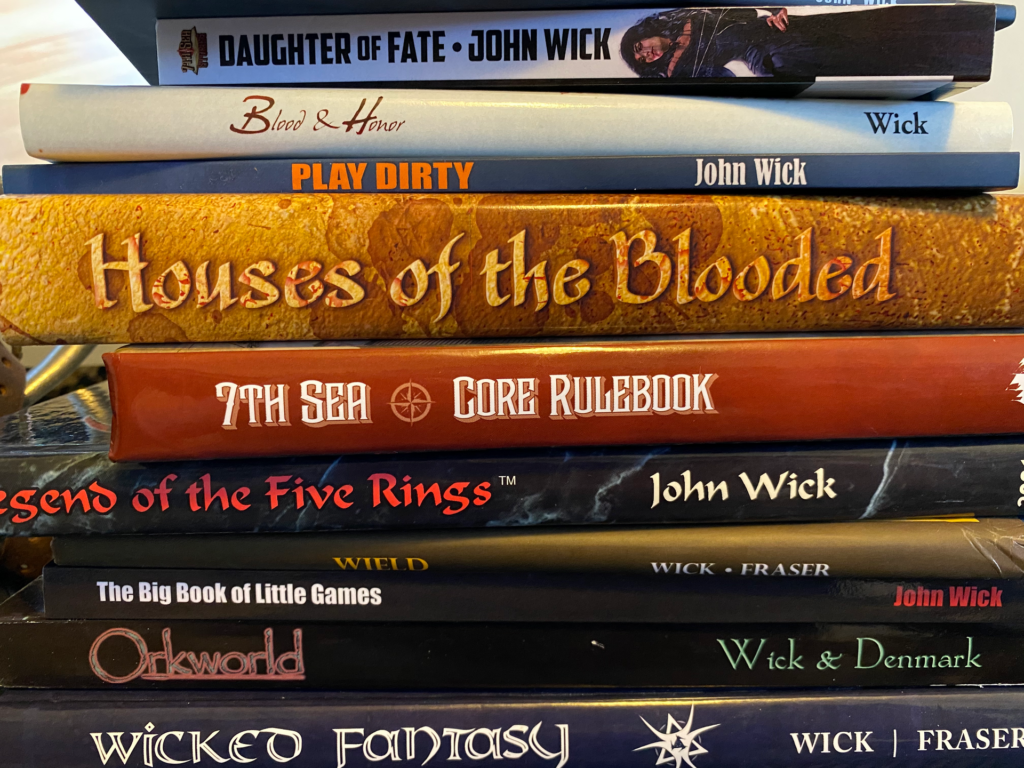Let’s start with the latter, shall we?
Matt Forbeck writes a lot of words. Tons of them. I used to hang out with him a lot at conventions, although we don’t get the chance to do that anymore. One time, I was sitting in a seminar with seven people on the panel. Seven!
Meanwhile, out in the audience, we counted only three.
That’s pretty typical for a gaming panel. I mean, if you get more than a dozen, you’re cooking with gas.
Looking at the audience, Matt says, “Time to move the panel to the bar!” Which is exactly what Forbeck’s Law is.
“Whenever the panelists outnumber the audience,
the panel moves to the bar.”
I’ve spread Matt’s rule as far as I can—even though I don’t usually drink anything stronger than Classic Coke—because the panel suddenly becomes much more intimate. Also, as Matt informed me, the audience tends to buy the panelists drinks.
This year, attending DragonCon, I noticed something odd. I never needed to invoke Matt’s Law. In fact, the panels were crammed with people. Loaded with them. Enthusiastic, full of questions. They just kept showing up. I’d only seen this in Poland—another story for another time—but never in the United States.
(Granted, I don’t do panels at GenCon, which is probably the exception to the rule. But only probably.)
I sat on six panels at DragonCon and all of them were a blast. One or two, however, suffered from the “too many cooks” problem. When you have six people sitting at the table and only an hour to talk, nobody gets to say anything meaningful.
(I’m pretty sure there’s no Law for that. Hm…)
But most of the panels only had one or two people—maybe three—and we all got to “get our stuff in” as professional wrestlers like to say.
One of the high points of the convention for me was a surprise meeting with an old friend of mine: Robert Boney. I met Robert when I moved to Georgia and we played a lot of RPGs together. He showed up with a beard and offspring who were polite and beautiful. Robert knew me when I was just 16 and still figuring out who I was. Modern psychology was just figuring out teen depression and didn’t quite know how to deal with it. Hell, I didn’t know how to deal with it. Despite my curious—and probably infuriating—problems, he remained my friend. And more than thirty years later, sought me out at DragonCon to say hello. Unfortunately, that’s pretty much all we got to say. I hugged him as hard as I could and promised to keep in touch better.

And so, “Hi Robert!”
At that same seminar, a fellow asked me a GM question.
Bonus for you, Faithful Reader! I don’t know if this is actually the case, but I learned this from Robin Laws, so I’m calling this “Robin’s First Rule of Game Seminars.”
All Game Seminars Eventually Turn into GM Advice Seminars
There’s probably a proper name for it, and I’m sure either Robin or Ken Hite will correct me within 24 hours of this posting.
Anyway, a GM question. He told me the story of a player who liked to cause trouble in a particular way: pissing off another player’s deity. Whenever the cleric’s deity shows up or they encounter a temple or a shrine, the trouble player—let’s call him “Bob”—does whatever he can to piss the deity off.
“So, he’s an antitheist,” I said.
The GM looked at me quizzically.
“He thinks gods are a bad thing for humanity.”
The GM nodded. “Yeah, I guess so.”
I said, “Okay. First thing you do. Take the player aside and find out if this is intentional. Does he really want his character to do this and is he okay with in-game consequences for his actions. If he says ‘Yes,’ then, move on to Step 2.”
“What if he doesn’t say yes?” the GM asked me.
“Then find out why he’s doing it. But chances are, he’s doing it intentionally. And if that’s the case, here’s what you do.”
I told him, “Have the deity show up again. When Bob smacktalks the deity, have the god throw a thunderbolt or something. Doesn’t matter. Whatever you want. The thunderbolt bounces off Bob’s chest. It doesn’t affect him at all.”
The GM looked at me skeptically. “What do you mean?”
“I mean his antitheism protects him from divine magic,” I said.
The GM shook his head. “No. That will make him worse.”
I smiled. “Yes, it will. He’ll jump up and down and shout and thumb his nose at the cleric’s deity and he’ll be a complete ass about it…until he needs a healing spell.”
That’s when the GM started to get it. He returned my smile and nodded. “Not just that god’s magic…”
I finished his thought, “… all divine magic. The healing spells, the protection spells, the buff spells.”
We said it together, “Everything.”
Then, I told him, “And the only way to get it back…is if he submits to the gods. If he humbles himself. If he becomes the penitent man.”
“Only the penitent man will pass,” he said, picking up on my cue.
I nodded. “That’s right. And until he does, no divine magic.”
The GM shook my hand. “That’s awesome.”
“Another day’s work,” I said, smiling. He walked away and I spent the rest of the day wondering how that little trick was going to work.
Next Time!
Next episode of my DragonCon trilogy focuses on…well, you’ll just have to tune in to find out! See you then!
